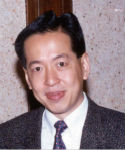
Prof. Chumin Wang
National Autonomous University, Mexico
Title: Multiscale design and experimental validation of porous silicon photonic devices
Abstract:
The first principle design of photonic devices based on many-body quantum mechanics has long been a major aspiration in materials science and engineering. However, the presence of non-periodic structural interfaces in such devices precludes the use of reciprocal space methods, while directly solving 10^23 coupled Schrödinger equations in real space would require unavailable yottabytes (YB) of memory just to store the positions of all involved atoms. In this work, we present a hybrid quantum-classical multiscale approach for designing an omnidirectional Bragg reflector. This multiscale design begins with ab-initio calculations of the dielectric function for each layer derived from specific atomic configurations. This is followed by a study of light propagation along the multilayer structure using the transfer matrix method within the framework of classical electromagnetic theory. To validate this design, we fabricated a freestanding nanostructured porous silicon multilayer via electrochemical etching of a highly doped p-type [100]-oriented crystalline silicon wafer, by alternating two anodic current densities and applying a final high-current pulse to detach the multilayer from the substrate. Measured light transmittance spectra show very good agreement with the theoretical predictions from the multiscale design. Moreover, this design strategy has been successfully applied to other photonic devices, such as Fabry-Pérot microcavities formed by two Bragg reflectors, which exhibit sharp optical resonance peaks due to photon confinement between the multilayer mirrors.
This work has been supported by CONAHCyT-CF-2023-I-830, UNAM-DGAPA-IN110823 and LANCAD-UNAM-DGTIC-039.
Biography:
Prof. Wang received the B.S., M.S., and Ph.D. degrees in physics from the National Autonomous University of Mexico (UNAM). He was a Postdoctoral Associate at the Department of Physics, University of California, Berkeley, from 1993 to 1994. He is currently a tenure-track full professor and department chair at the Materials Research Institute, UNAM. His research interests include strongly correlated electron systems and elementary excitations in quasicrystals as well as in porous semiconductors.